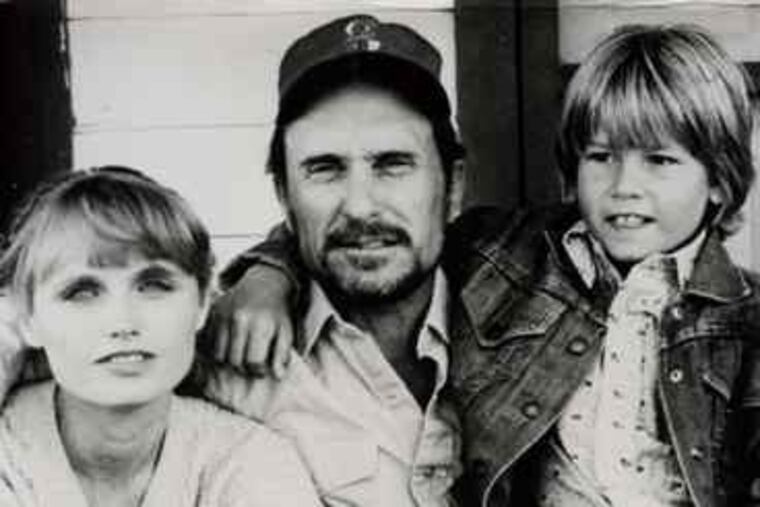Bridges' Bad Blake struck a chord
From Dan DeLuca's "In the Mix" www.philly.com/philly/blogs/inthemix Jeff Bridges is unquestionably outstanding in Crazy Heart, the movie about a burnt-out cowboy troubadour named Bad Blake that is up for three Oscars, including Bridges for best actor.

'Crazy Heart,' 'Tender Mercies,' and 'Payday'
From Dan DeLuca's "In the Mix"
www.philly.com/philly/blogs/inthemix
Jeff Bridges is unquestionably outstanding in Crazy Heart, the movie about a burnt-out cowboy troubadour named Bad Blake that is up for three Oscars, including Bridges for best actor.
The dude who played the Dude will probably take home the statue on Sunday, and deservedly so, though I thought a grieving Colin Firth was equally great in A Single Man. But Bridges' Bad Blake is the kind of attention-grabbing performance that everyone calls "brave," where the actor proves willing to sacrifice his or her dignity to get at something essential about the human condition.
Halle Berry did it in Monster's Ball to win in 2002, though she had to roll around naked with Billy Bob Thornton to earn her trophy. Mickey Rourke paraded around in spandex last year in The Wrestler - a movie with a lot of parallels to Crazy Heart - and still he lost the Oscar to Sean Penn. By comparison, all Bridges had to do was expose his 60-year-old bloated carcass as he desperately tried to make it to the toilet in time to throw up.
I don't mean to denigrate Crazy Heart, which I enjoyed immensely, from Bridges' super-grizzled, showstopping turn to the T Bone Burnett-produced soundtrack. . . .
The thing I might have liked the best, though, is that it sent me off on a country-singer movie bender of my own.
Thanks to Netflix and Turner Classic Movies, I went on a compare-and-contrast venture, holding Crazy Heart up to two other movies about hard-earned, honky-tonkin' home truths. And my snowbound viewing got me thinking about how even up-from-the-art-house indie films like Crazy Heart tend toward the pat and sentimental, and how everyone seems to be afraid to make an honest to goodness feel-bad movie anymore.
The two other journeyman country-singer movies I watched were Tender Mercies, Bruce Beresford's 1983 good-hearted yarn starring Robert Duvall, who won a best actor Oscar for his role as quietly intense recovering alcoholic Mac Sledge, and Payday, Daryl Duke's 1973 irredeemable tale starring the brilliant Rip Torn, who plays Maury Dann, a rotten SOB, with evil-eyed relish.
Tender Mercies and Payday are nervier than Crazy Heart, each in its own way. Beresford's movie, from a just-this-side-of-corny script by playwright Horton Foote (which also won an Oscar) begins with Duvall's Sledge attempting to rebuild his life after he meets a young single mother with a cute towheaded boy, just as Bridges' Blake does in Crazy Heart. Tess Harper, in her first movie role, does a convincing, unself-conscious job as Sledge's second wife.
All of Duvall's hell-raising is over after the first scene. Tender Mercies dares - and succeeds - to try to hold your attention with a story about a decent man who went terribly wrong and is now slowly trying to make things right. Along the way, he'll find that no matter what he does, events are likely to conspire against him: "I don't trust happiness," he says. "I never did, and I never will." (The movie's even got a local angle: Country-folk songwriter Craig Bickhardt, from Glen Mills, wrote two songs for Tender Mercies, and that's him singing "You Are What Love Means to Me" as the credits roll.)
Payday is an entirely more nasty and brutish affair, a cult movie that was a commercial failure in its time. A contemporary assessment seemed all the more appropriate after the now 78-year-old Torn got himself in a spot of trouble last month when he walked into a bank with a loaded gun, so inebriated, his lawyer claimed, that the actor thought he was in his own house.
Payday was directed by Daryl Duke, but more importantly, it was written by Don Carpenter, the all-but-forgotten hard-boiled American existential master who died in 1995. (His brilliant, and long out of print novel Hard Rain Falling was reissued last year with a forward by novelist George Pelecanos.)
"You only go though life once," Torn's Maury Dann says. "You might as well do it in a Cadillac." As he tours the mid-South, he does plenty of bad things in the backseat of his Sedan de Ville and doesn't feel bad about any of them.
Payday's got a wicked streak a mile wide, and it takes a cynical worldview that's much more in keeping with the feel-bad movies of the '70s like Network or Straw Dogs that reflected the curdled disillusionment of the Nixon years that followed the idealism of the '60s. It's a black comedy that's fun to watch, though, because Torn enjoys himself immensely, playing an amoral character who's not the slightest bit interested in redemption. . . .